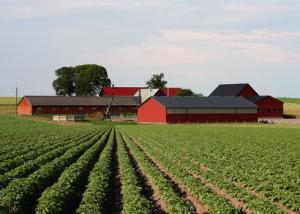Food securityNurturing the future of agriculture
Climate change and man-made events put global food security at risk. But researching how plants produce seeds and evolve could help us find new ways to ensure food security. For the first time in its history, the Global Seed Vault on the Svalbard Islands, Norway, has authorized a withdrawal. It was requested in 2015 by Syria, a country where the war is endangering the local agricultural seed collections.

Farms may depend on seed banks to recover from disasters // Source: wikipedia.org
Climate change and man-made events put global food security at risk. But researching how plants produce seeds and evolve could help us find new ways to ensure food security.
For the first time in its history, the Global Seed Vault on the Svalbard Islands, Norway, has authorized a withdrawal. It was requested in 2015 by Syria, a country where the war is endangering the local agricultural seed collections.
CORDIS reports that the frozen storage facility in the Norwegian archipelago is one of the many seed banks in the world. They act as a food security insurance, should a catastrophic event jeopardize agricultural production. Examples include conflicts and environmental variations caused by climate change.
“Seeds contain the embryo, like a miniature plant , and are therefore the basis for the next generation of plants,” says Ilse Kranner, a plant physiologist at the University of Innsbruck, Austria, and research coordinator at EcoSeed, an international project aimed at better understanding the impacts of environmental conditions on seed quality.
When plants face adverse conditions they may respond by giving less seeds or worse still, abort seed production altogether. “Our research focuses on how increasing temperatures and more frequent droughts will affect seed germination and plant establishment,” explains Kranner.
But seed banks and collections are also important for another reason: they are a sort of treasure trove for genes that express, or could express, different characteristics able to help plants face particular conditions. For example, the ability to grow despite a more erratic rain pattern or a higher average temperature. Conditions that many parts of the earth may face in the future.
“According to the severity of environmental stress that plants undergo while growing, they may lose not only some of their seeds, but also the genetic traits that could be of importance to us in a different scenario”, says Salvatore Ceccarelli, former researcher at International Center for Agricultural Research in the Dry Areas (ICARDA) in Aleppo, Syria, and now consultant for Rete Semi Rurali.
For these reasons, “our research project’s consortium includes the EU’s largest crop seed bank – run by Leibniz Institute of Plant Genetics and Crop Plant Research at Gatersleben, Germany – and the Millennium Seed Bank of the Royal Botanic Gardens Kew, London, housing the largest seed collection of wild plants,” says Kranner.
The scientists are hoping to create new knowledge and the genetic resources in order to “understand how to store and handle seeds in the most efficient way, and to capture plant genetic diversity as an insurance for the benefit of global agriculture in the future.” An example would be producing new more resilient varieties of plants.
Some initial issues have now been overcome. “We needed to grow plants under strictly controlled conditions, a somewhat tricky task,” says Kranner.
Ceccarelli is experimenting with a novel solution, called evolutionary plant breeding. The idea is that you do not artificially select which plants to grow, but you mix different varieties of the same crop.
In higher temperatures and with less water due to climate change, some of the plants will contribute more seeds to the next generation, and after several cycles, their characteristics will be more present in the population.
“You just need to do it with a portion of your seeds: the rest can be stored as an insurance stock or planted in other fields as usual,” says Ceccarelli, who is collecting data supporting his method in smaller projects around the world.
The knowledge from the latest studies on seed germination is going to become more and more critical. The impacts of climate change are spreading throughout the world, as underlined by the results of the recent United Nations conference held in Paris (COP21).
